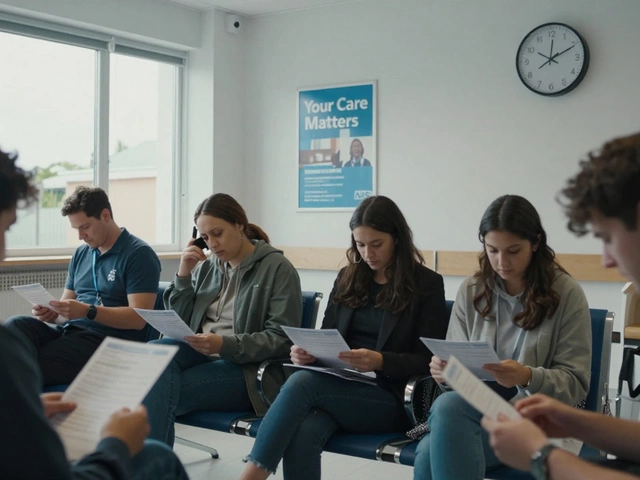Tooth pain is brutal. When your teeth are rotting and you don’t have cash for a dentist, every meal is nerve-wracking. You start avoiding smiles, then friends. So, what now? Well, the bad news: ignoring decay only makes things worse. Teeth don’t fix themselves, and infection can spread to your gums, jaw, and even your heart.
The good news is you’re far from alone. NHS waiting lists are bursting, and private care can cost more than a holiday abroad. But there are a few things you can do right now that don’t require a bank loan. First, don’t brush off symptoms—if you’ve got pain, swelling, or pus, it’s time to find help fast. Clubs, charities, even some mobile clinics offer basic dental treatments for free or nearly-free. You just have to know where to look—or who to ask.
Most importantly, don’t give up. While dental implants might seem way out of reach, there are sometimes workarounds or payment options you’ve never heard about. And while no home fix beats proper dental care, small changes in your day-to-day habits can slow down decay and make a real difference.
- Why Teeth Rot Even When You Brush
- What NHS Dentists Really Cover
- Emergency School: DIY and Temporary Fixes
- Finding Cut-Price or Free Dental Help
- Are Dental Implants Ever Affordable?
- Staying Sane: Support and Mental Health
Why Teeth Rot Even When You Brush
You might be scrubbing twice a day and still finding holes, pain, or brown spots. It’s honestly frustrating—and super common. Brushing alone doesn’t always win the war on decay because there’s a lot more going on in your mouth than meets the eye.
The main culprit behind rotten teeth is bacteria in plaque. Even when you brush, some sticky plaque hides between teeth and under your gums. Most standard toothbrushes can’t reach those tiny gaps. If you skip flossing—even for a few days—that’s plenty of time for bacteria to get busy breaking down enamel.
Diet plays a big part. Fizzy drinks, juice, sweets, even white bread and crisps create a buffet for decay-causing bacteria. Every time you eat sugar or starch, the bacteria produce acid. That acid chews straight through enamel. Brushing helps, but if you’re snacking all day, your teeth rarely get a break from those attacks.
- Dry mouth is another sneaky problem. Saliva washes away bacteria and helps protect teeth. Medications (like antidepressants or blood pressure pills), stress, or just not drinking enough water can dry your mouth out and make decay worse.
- Genetics are real. Some people naturally have weaker enamel or deeper grooves in their teeth. If your family’s full of fillings and dental trouble, you might face an uphill climb, no matter how well you brush.
- Skipping regular dentist visits means you miss early warning signs. By the time things look or feel bad, it’s already serious.
| Factor | Why It Matters |
|---|---|
| Poor Diet (Sugar/Starch) | Feeds bacteria that make acid and damage teeth |
| Missed Spots | Plaque left between teeth and gums still causes decay |
| Dry Mouth | Less saliva = more bacteria sticking around |
| Genetics | Some people have softer enamel or deeper pits |
| Lack of Dental Check-ups | Small problems aren’t caught early |
Here's the thing: even the best electric toothbrush can’t replace proper flossing, smart snacking, and getting regular check-ups. And if you’re after affordable dental implants UK wide and still battling constant decay, fixing these basics gives you a fighting chance of keeping any new teeth healthy in the long run. Don’t beat yourself up—some stuff is out of your control—but try tackling what you can, one step at a time.
What NHS Dentists Really Cover
The NHS will treat you if your condition is urgent, but they won’t hand out dental implants for free. Here’s how it works: if you’re registered with an NHS dentist in England, you pay for treatment in three set bands, except if you qualify for free NHS dental care (like pregnant women, people under 18, or folks on some low-income benefits).
- Band 1 (£26.80 in 2025): A check-up, diagnosis, advice, and x-rays. If all you need is a simple clean or polish, this is your bracket.
- Band 2 (£73.50): Covers fillings, root canals, and extractions. Sadly, it doesn’t include crowns, bridges, or dentures.
- Band 3 (£319.10): This is for more complex things like crowns, dentures, and bridges—but not dental implants.
Here’s what you won’t find covered on the normal NHS list: white fillings for back teeth, cosmetic work, or those much-wanted dental implants (unless there’s a serious medical need, which is rare and usually needs a specialist’s referral). Dentists tend to pull rotten teeth or do fillings. If you ask about dental implants UK practices under NHS, most will just shake their heads.
Here’s a quick look at what’s included and what isn’t:
| Treatment | NHS Covered? |
|---|---|
| Extractions (removing teeth) | Yes, in Band 2 |
| Fillings (silver for back teeth) | Yes, in Band 2 |
| Dentures (false teeth) | Yes, in Band 3 |
| Crowns and Bridges | Yes, in Band 3 |
| Root Canal | Yes, in Band 2 |
| Dental Implants | No, except medical emergencies |
| Teeth Whitening | No |
If you can’t pay these fees, see if you qualify for HC2 certificate (help with health costs). Fill in the form and send it off—plenty of people on Universal Credit get it. It’s also worth asking your local practice if they’re actually taking NHS patients, since lots have really long waits or are full up.
Emergency School: DIY and Temporary Fixes
If you can’t see a dentist right away, you’re basically in damage-control mode. Don’t try weird trends or TikTok hacks—some can make things worse. Here’s what’s actually tried and tested for dental emergencies in the UK.
- dental implants uk aren’t something you can DIY—if a tooth is already gone or roots are exposed, there’s no safe at-home fix. But you can buy emergency repair kits at most chemists. These include dental cement for chipped teeth or lost fillings. It’s not a forever solution, but it protects the nerve and stops food getting stuck.
- If you’ve got pain, stick to paracetamol or ibuprofen as per the packet. Don’t put painkillers directly on the tooth—this burns gums and does nothing for nerves inside the tooth.
- Saltwater rinses are the old-school trick that actually works. Dissolve a teaspoon of salt in warm water, swish for 30 seconds, spit (don’t swallow). This fights bacteria and soothes sore gums.
- If you notice swelling or can’t open your mouth, don’t mess about—this could be an abscess, and it’s serious. Head to A&E if you get a fever or swelling moves towards your neck/eye. Infections can be deadly if ignored.
- Avoid hot, cold, or sugary food and drinks if your tooth is sensitive. Chew on the other side of your mouth until you get proper help.
Having clear dental wax (from chemists or braces kits) is a game changer for sharp broken teeth—it’ll stop your tongue or cheek getting shredded. If you can’t find wax, a tiny piece of sugar-free chewing gum over a sharp edge can help in a pinch. None of these fixes are long-term, but they can get you through until a trained pro steps in.

Finding Cut-Price or Free Dental Help
If dentist bills make you want to run and hide, you’re not the only one. Dental treatment in the UK can be eye-wateringly expensive when you have to go private, especially for something big like dental implants uk. But don’t lose hope yet—there are places and ways you can get help for less, or even nothing.
The first stop is still the NHS. NHS dentists offer way cheaper care than private clinics—but there’s a catch. Many areas have months-long waiting lists or aren’t taking new patients. Don’t let that put you off. Check nhs.uk every few weeks and call around practices in a 30-mile radius. Sometimes, a slot opens with little notice.
For urgent problems, go to NHS 111 or walk-in urgent dental clinics. These might only offer pain relief, antibiotics, or pulling a tooth—but that’s sometimes better than nothing when things get bad.
Dental schools are a hidden gem. Student dentists (supervised by pros) offer reduced-price work in most big cities. Expect long appointment times—teaching takes a while—but you could save hundreds of pounds on fillings or extractions.
- Look up dental hospitals at universities like King’s College London, Manchester, or Birmingham.
- Ask for the 'student clinic' or 'teaching clinic'.
- Prices can be as low as £15 for an exam, with other treatments heavily discounted.
Charities and temporary pop-up clinics also help fill the gap. Organisations like Dentaid, Crisis, or the Dental Wellness Trust run free clinics in some UK cities, especially for those on benefits or without a fixed address. Services might be basic, but they help when you’re stuck.
| Option | Eligibility | Typical Cost |
|---|---|---|
| NHS Dentist | UK Residents | £26.80+ per band |
| Dental School | Anyone, but limited places | £15+ exam, much cheaper treatments |
| Charity/Pop-up Clinic | People in need (low income, homeless, etc.) | Free/Minimal |
| Urgent NHS Clinic | Emergency cases | Free/Reduced |
Money still tight? Some places offer payment plans or let you split the bill over a few months. Ask directly—lots of people don’t know help is there unless they ask. Worst case, the Citizens Advice Bureau can point you to emergency grants or support if you’re really struggling.
Are Dental Implants Ever Affordable?
A lot of people get a shock when they hear how much dental implants uk can cost. In the UK, a single dental implant usually sets you back £2,000 to £2,500. That’s just for one tooth, not a full row. Why is it so expensive? You’re paying for the materials, the time, and years of dental training—not to mention specialist equipment. Here’s a quick look:
| Treatment | Ballpark Cost per Tooth |
|---|---|
| Basic Extraction (NHS) | £65 |
| Basic Denture (NHS) | £319 |
| Dental Implant (Private) | £2,500+ |
The NHS almost never pays for implants unless you’ve lost teeth due to accident, cancer, or a serious medical problem. If your teeth have rotted, they’ll usually offer dentures or a bridge instead, not an implant. Private practices sometimes offer payment plans, but you’ll still need good credit, and interest can add up fast.
So what can you do if you really need implants but flat out can’t afford them?
- Look for university dental schools. Dental students (supervised by trained dentists) sometimes need patients for their exams or practical work, and they offer discounted rates. Places like King's College Dental Hospital in London run these schemes—and while not everyone will qualify, it’s worth asking.
- Consider going abroad. Some people head to Hungary, Poland, or Turkey for cut-price implants. But this is a big gamble since it comes with travel costs and aftercare risks. If you go down this route, always check the clinic’s reputation, and plan for what you’ll do if something goes wrong once you’re back home.
- Ask about dental charities. In rare cases, UK dental charities step in to help people in dire straits. They can’t pay for everyone’s implants, but if your case is really severe (think serious disfigurement or inability to eat) it’s worth contacting groups like Dentaid or Bridge2Aid.
- Check for payment plans. Even though interest rates can be painful, some clinics offer low-interest deals or will let you pay over a couple years. Always read the small print so costs don’t multiply on you.
One thing to remember: any ad promising “cheap dental implants UK” should get a second look. Super-low prices often mean hidden risks—cheap materials, unqualified staff, and zero aftercare. If the price sounds too good to be true, it probably is.
Staying Sane: Support and Mental Health
Rotten teeth don’t just hurt your mouth—they mess with your head, too. Shame, low confidence, even depression, can seriously hit when your teeth are in bad shape. A study by the Oral Health Foundation in 2023 found that nearly 60% of people in the UK with poor dental health felt embarrassed about smiling or talking. That’s a huge chunk of us struggling with more than just toothache.
The thing is, feeling stressed or down because your teeth are rotting isn’t “just in your head.” This stuff is real, and it can chip away at your social life, your job chances, and your sleep. And if you’re already skint and can’t fix things, it can start to feel hopeless.
- Reach out for support. You don’t have to wait for a dentist to get a bit of help. Local charities—like Mind or the Samaritans—aren’t just there for big life crises. They listen, and they actually get loads of calls about money and dental stress.
- Join online groups. Loads of people are dealing with this exact headache. Try Facebook groups focused on low-cost healthcare or even UK dental forums. Sometimes talking to people in the same boat helps take the edge off the shame.
- Tell a friend or family member—even just saying it out loud can make problems feel smaller.
Practising basic self-care is also a big deal. Little routines like regular brushing and using mouthwash (even if it feels pointless) can give you back a bit of control. Eating softer, nutritious foods can keep your energy up and take the pressure off your teeth.
| Where to Get Support | How They Help |
|---|---|
| Mind | Confidential support by phone, text, or online |
| Samaritans | 24/7 emotional support for any issue |
| Community Dental Services | Help finding affordable dental care, advice on NHS cover |
| Smile for Life (charity) | Peer support for people struggling with dental issues |
If you’re still feeling rough, call your GP. Sometimes the stress of dental problems can turn into real anxiety or low mood, and you’re allowed to ask for help. They won’t judge you for needing practical advice or even just a safe space to talk.
Dealing with bad teeth in the UK on a tight budget is draining, but looking after your mind matters as much as your mouth. You’re definitely not the only one dealing with this, even if it feels that way sometimes.




